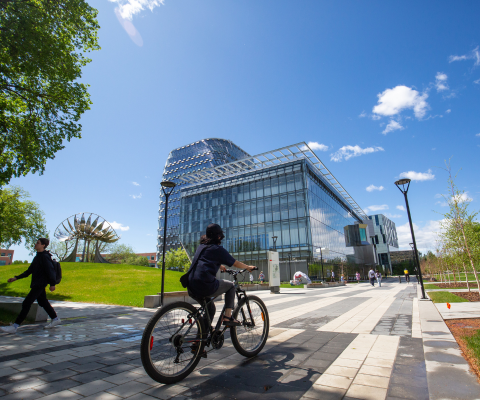Canada must get its house in order, or risk losing the global fight for talent

This op-ed was published by the Toronto Star December 7, 2022
Philip Steenkamp is chair of Universities Canada’s international committee and president of Royal Roads University.
When you ask Canadian employers and business leaders what keeps them up at night, some may mention inflationary pressures, while others may point to supply chain disruptions. But increasingly, they’ll talk about the urgent need for talent.
That’s no surprise. Canada’s ongoing talent crisis is well documented and thoroughly unaddressed.
With 55 per cent of Canadian entrepreneurs struggling to hire the workers they need, according to a recent BDC study, it’s time for a solution. Immigration is a part of that solution.
Immigration is necessary to keep Canada competitive in a global, green, and skilled economy, especially in a time of aging populations and fierce international competition. Canada needs this skilled and specialized talent to fill 400,000 new jobs in growing and evolving fields, such as clean energy, tech, and advanced manufacturing. One of the best places to find this talent is among international students.
International students are twice as likely as domestic students to study engineering and more than two and a half times as likely to study math and computer sciences ― two top areas of projected labour shortages. International study is also a pillar of Canada’s immigration strategy, with about 17 per cent of all new permanent residents and almost 40 per cent of immigrants in the economic category having prior Canadian study experience.
Nevertheless, it’s challenging for international students — who can expedite our transition to an increasingly global, green and skilled nation — to come study here.
As of Sept. 30, Immigration, Refugees and Citizenship Canada (IRCC) had a backlog of nearly 900,000 temporary resident applications, including study permits for international students. IRCC aims to process study permits in 13 weeks, a standard not achieved in many cases. In contrast, it takes three weeks to issue these permits in the United Kingdom and United States.
The result is more and more international students looking beyond Canada as they choose where to study, where to establish roots and where to bring their highly sought skills to market. The harm this is causing to Canada’s reputation is severe. Each time a promising student with an offer of admission from a Canadian university studies elsewhere because of visa processing delays, we are telling the world that we’re more focused on administrative process than innovative progress.
The solution is for Canada’s government to rethink and resource ways to decrease study permit processing time, just as our peer countries have done. The $50 million committed in the recent Fall Economic Statement to reduce backlogs, and the hiring of 1,250 new IRCC employees in August — two weeks before the start of university classes — is helpful, but an approach that addresses the systemic challenges, in collaboration and consultation with Canada’s universities, is long overdue.
At stake is the flow of international talent into Canada — talent that will be fostered at Canada’s universities and keep us competitive. If we want to open the door, the house needs to be in order.
About Universities Canada
Universities Canada is the voice of Canada’s universities at home and abroad, advancing higher education, research and innovation for the benefit of all Canadians.
Media contact:
Lisa Wallace
Assistant Director, Communications
Universities Canada
[email protected]
Tagged: Global connections
Related news
-

BCDI 2030 launches second round of funding for scholarship projects for study in Canada
-

Universities are advancing technology through international partnerships
-

Universities Canada's response to Minister Miller's announcement on international student caps
-

How international research partnerships are helping us tackle world health issues
